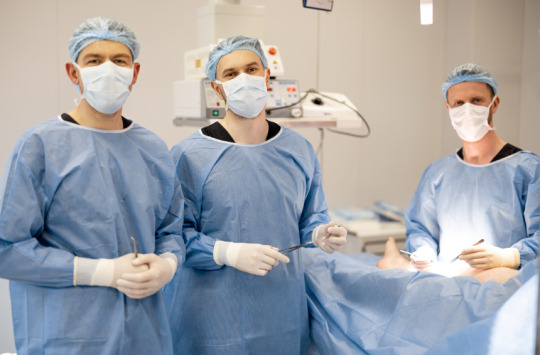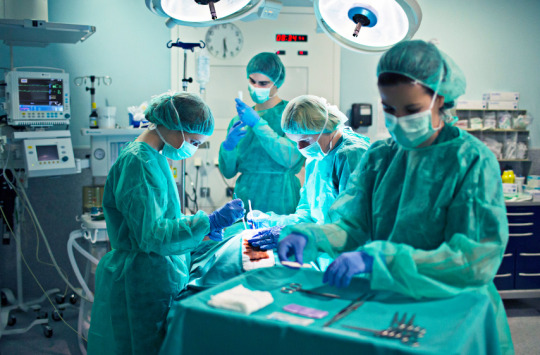#herniasurgeryinjabalpur
Text

Inguinal Hernia:
The most common type occurs in the groin.
Often requires hernia surgery in jabalpur performed by a skilled hernia surgeon.
Umbilical Hernia:
Bulging near the belly button.
May necessitate hernia surgery for repair.
Incisional Hernia:
Develops at the site of a previous abdominal surgery.
Treatment may involve hernia surgery to reinforce the weakened area.
Hiatal Hernia:
Occurs when part of the stomach protrudes through the diaphragm into the chest cavity.
Surgical intervention by a hernia surgeon in jabalpur may be necessary for severe cases.
#herniaoperationinjabalpur#laparoscopicherniaspecialistinjabalpur#bestherniasurgeoninjabalpur#herniasurgeoninjabalpur#herniasurgeryinjabalpur
0 notes
Text
Which Hernia Surgery is the Safest Option?

Hernias are a common medical condition affecting millions of people worldwide. While they can be uncomfortable and sometimes painful, the good news is that hernia repair surgeries are highly effective in treating this condition. However, when faced with the decision of undergoing hernia surgery, one of the most pressing concerns for patients is often which type of surgery is the safest. In this blog, we'll explore the various hernia surgery options and discuss their safety profiles to help you make an informed decision.
1. Open Hernia Repair Surgery:
Traditional open hernia repair surgery involves making a single large incision near the hernia site to access and repair the weakened muscle or tissue. This procedure typically requires general anesthesia and may involve a longer recovery period compared to minimally invasive techniques. While open hernia surgery in Jabalpur has been performed for decades and is considered safe, it carries some risks such as infection, bleeding, and longer hospital stays.
2. Laparoscopic Hernia Repair Surgery:
Laparoscopic hernia repair, which is also referred to as minimally invasive surgery or keyhole surgery, is the process of creating several small cuts through which a laparoscope and the rest of the equipment are inserted. The principle of this technique is that the best hernia surgeon in Jabalpur can move closer to the hernia site and perform the repair without the need for a large incision. Laparoscopic hernia surgery in Jabalpur is linked with shorter healing time, less postoperative pain, and a decreased chance of complications e.g. infection and bleeding, compared to open surgery.
3. Robotic-Assisted Hernia Repair Surgery:
Robotic-assisted hernia operation in Jabalpur is a relatively newer approach that combines laparoscopic techniques with robotic technology to enhance surgical precision and control. The surgeon controls robotic arms equipped with miniature surgical instruments to perform the procedure through small incisions. While robotic surgery offers advantages such as improved dexterity and visualization, its safety profile is comparable to laparoscopic surgery in Jabalpur, with similar risks and benefits.
4. Mesh vs. Non-Mesh Repair:
Another factor to consider in hernia surgery safety is whether a mesh is used to reinforce the repaired tissue. Mesh hernia repair is common in both open and laparoscopic surgeries and is associated with lower rates of hernia recurrence. However, there have been concerns raised about the potential risks of mesh complications, such as infection, adhesion, and mesh migration. Some patients may opt for non-mesh repair techniques, although these may have higher recurrence rates in certain cases.
In conclusion, the safety of hernia surgery depends on various factors including the type of procedure, surgical technique, and individual patient factors. While open hernia repair has been performed for many years and is generally safe, laparoscopic and robotic-assisted surgeries offer advantages such as shorter recovery times and reduced risk of complications. Ultimately, the choice of which hernia surgery is safest should be made in consultation with your hernia surgeon in Jabalpur, taking into account your specific medical history, hernia type, and preferences. Remember to discuss all available options and potential risks and benefits to make an informed decision that prioritizes your health and well-being.
#laparoscopicherniaspecialistinjabalpur#herniaoperationinjabalpur#laparoscopicsurgeryinjabalpur#herniasurgeryinjabalpur#herniasurgeoninjabalpur#bestherniasurgeoninjabalpur
0 notes
Text
Choosing the Right Hernia Surgeon: A Vital Decision for Your Health

A hernia diagnosis, though overwhelming, can still be managed with the help of the right surgeon who can make the journey bearable and confident through it all. From inguinal to umbilical, or any other type of this condition, find and visit only the best specialists in hernia surgery to make sure you will have a good recovery. This article will look into the things you need to take into account while discovering the right one for your situation to be sure that you have a hernia surgeon in Jabalpur with a high-quality service ranging from diagnosis to postoperative recovery.
The Importance of Selecting the Best Hernia Surgeon
Hernia surgery in Jabalpur is a hernia medical procedure needing both expertise and superior accuracy. The most important factor to be considered by you in the choice of a hernia surgeon will be your treatment experience. Here's why:
1. Expertise Saves Lives: Hernia operation in Jabalpur requires cutting-edge technology and the ability of the surgeon. The proficiency of the experienced hernia surgeon enables him or her to conduct some difficult procedures with decent accuracy, thus minimizing the probability of negative matters and bringing a faster recovery process after surgery.
2. Personalized Care: All patients are different and an experienced hernia surgeon knows the significance of careful tailoring of a surgical plan. They add a personal touch by knowing you best of all that they know about your personal needs, favorite colors, and medical background to come up with a unique treatment plan with the highest success rate.
3. Advanced Techniques: With the constant evolution of hernia surgeries nurturing new methods and technologies to enhance patient outcomes, the field is growing fast. A top-notch hernia surgeon is always up-to-date with the latest advancements in the field as well as well-versed with minimally invasive procedure options such as laparoscopic and robotic surgeries that promote speedier recovery times and lessened scarring.
4. Compassionate Support: It is natural to feel anxious when you have surgery scheduled, but the compassionate surgeon will accompany you through the process upholding his professionalism. The best hernia surgeon in Jabalpur takes time to explain the procedure in detail, and answer your concerns and fears; thereby, ensuring you the correct treatment while ensuring that you are informed, empowered, and reassured.
Choosing the Best Hernia Surgeon: Key Considerations
When selecting a hernia surgeon, consider the following factors to make an informed decision:
1. Credentials and Experience: Look for a surgeon who is board-certified in laparoscopic hernia surgery in Jabalpur and has extensive experience performing hernia repairs. Review their credentials, including their education, training, and track record of success.
2. Patient Reviews and Testimonials: Reading reviews and testimonials from previous patients can offer valuable insights into the surgeon's bedside manner, skill level, and overall patient satisfaction. Pay attention to feedback regarding communication, professionalism, and outcomes.
3. Consultation Experience: Schedule consultations with potential hernia surgeons to discuss your condition, treatment options, and any concerns you may have. Pay attention to how well the surgeon listens to your needs, explains the procedure, and addresses your questions.
4. Hospital Affiliation: Consider the hospital or medical center where the surgeon practices. Choose a facility with a reputation for excellence in surgical care, state-of-the-art equipment, and comprehensive support services.
5. Gut Instinct: Trust your instincts when selecting a hernia surgeon. Choose someone who inspires confidence, instills trust, and demonstrates genuine care and compassion for your well-being.
Finding the best hernia surgeon in Jabalpur is a critical decision that can significantly impact your health and quality of life. By considering factors such as expertise, experience, patient-centered care, and personal rapport, you can select a surgeon who meets your unique needs and ensures the best possible outcome. Remember, your health is worth investing in, so take the time to choose wisely and embark on your hernia treatment journey with confidence and optimism.
#laparoscopicherniaspecialistinjabalpur#herniaoperationinjabalpur#herniasurgeryinjabalpur#bestherniasurgeoninjabalpur#herniasurgeoninjabalpur#laparoscopicherniasurgeryinjabalpur
0 notes
Text
Can Hernia Surgery Cause Infertility? Disproving Myths and Facts

Hernias are the most frequent medical complications that are experienced by almost millions of people in the whole world. They are acclaimed to occur when an organ or fatty tissue gets through a composite tissue or muscle wall presented by a weak spot or an opening. Though hernias usually demand surgical operations to be cured, however, issues that might come up maybe those concerns that could affect the fertility of the patients. In this blog, we delve into the question: What about the connection between hernia surgery and fertility? We will run fact checks, decipher myths, and explain the function of hernia surgery on your fertility.
Understanding Hernia Surgery:
Hernia surgery in Jabalpur, also known as herniorrhaphy or hernioplasty, is a common procedure aimed at repairing the weakened or torn muscle or tissue that allows organs to protrude. The surgery typically involves pushing the herniated organ back into place and reinforcing the weakened area with stitches or a mesh patch.
Myth: Hernia Surgery Causes Infertility:
One of the misconceptions surrounding hernia operation in Jabalpur is its alleged link to infertility. However, there is no direct evidence to suggest that hernia surgery itself causes infertility. It's essential to separate fact from fiction and understand the actual factors contributing to fertility issues.
Facts about Hernia Surgery and Infertility:
1. Location of Hernia: Hernias typically occur in the abdominal or groin area, far from reproductive organs such as the ovaries, uterus, and testes. As such, the surgical repair of a hernia in these areas is unlikely to affect fertility directly.
2. Surgical Technique: Modern surgical techniques for hernia repair prioritize minimizing damage to surrounding tissues and structures. Hernia surgeon in Jabalpur is trained to perform precise procedures that focus solely on repairing the hernia without interfering with reproductive organs.
3. Complications: While complications from hernia surgery are possible, such as infection or damage to nearby nerves, they rarely impact fertility. Surgeons take precautions to minimize these risks and address any complications promptly.
4. Recovery Period: Following hernia surgery, patients are typically advised to avoid strenuous activities for a period to allow for proper healing. However, once fully recovered, individuals can resume normal physical activities, including those related to conception and pregnancy.
Choosing the Best Hernia Surgeon:
When considering hernia surgery, selecting the right surgeon is crucial. Here are some tips for finding the best hernia surgeon:
• Board Certification: Look for the best hernia surgeon in Jabalpur who is board-certified and has specialized training in hernia repair procedures.
• Experience and Expertise: Choose a surgeon with extensive experience in performing hernia surgeries, including both open and laparoscopic techniques.
• Patient Reviews and Testimonials: Go through reviews and testimonials of former patients to determine the doctor's level of proficiency and client satisfaction.
• Communication Skills: Choose a surgeon who is willing to listen to your complaint, inform you about the procedure in detail, and deal with any questions you might have.
`
In conclusion, laparoscopic hernia surgery in Jabalpur does not cause infertility. While concerns may arise, understanding the facts and separating them from myths is essential. By choosing a skilled and experienced hernia surgeon in Jabalpur, patients can undergo successful hernia repair without worrying about its impact on fertility. As always, consult with a qualified healthcare professional for personalized advice and recommendations regarding hernia treatment and its potential effects on fertility.
#laparoscopicherniaspecialistinjabalpur#laparoscopicsurgeryinjabalpur#herniaoperationinjabalpur#herniasurgeryinjabalpur#bestherniasurgeoninjabalpur
0 notes
Text

Hernia surgery in Jabalpur involves repairing a hernia by returning protruding tissue to its original position and reinforcing the weakened abdominal wall. It aims to alleviate symptoms such as pain and discomfort and prevent complications like bowel obstruction. The procedure can be performed using open or minimally invasive techniques.
The following are the symptoms of a hernia:
Visible bulge or lump in abdomen, groin, or scrotum.
Pain or discomfort, especially when straining.
Heaviness or pressure in the affected area.
Swelling or enlargement.
Nausea, vomiting, or constipation if hernia becomes trapped.
Difficulty with bowel movements or urination in severe cases.
Dragging sensation in groin or testicular pain for inguinal hernias.
#laparoscopicherniaspecialistinjabalpur#herniasurgeoninjabalpur#herniasurgeryinjabalpur#herniaoperationinjabalpur
0 notes
Text
Understanding the Risks and Complications of Hernia Surgery

Hernia surgery is a common and generally safe procedure, but like any surgery, it comes with its set of risks and potential complications. It's essential for individuals considering or scheduled for hernia surgery to be informed about these aspects. Let's delve into the possible risks associated with hernia surgery in Jabalpur and how healthcare professionals work to mitigate them.
Understanding Hernia Surgery
Before exploring the risks, let's briefly understand what hernia surgery involves. Hernias occur when an organ or fatty tissue protrudes through a weak spot in the surrounding muscle or connective tissue. Laparoscopic hernia surgery in Jabalpur is often recommended to repair the weakened area and alleviate symptoms.
Common Risks of Hernia Surgery:
1. Infection:
Infections can occur post-surgery. Hernia surgeon in Jabalpur takes extensive precautions to maintain a sterile environment during the procedure, but infections remain a risk.
2. Bleeding:
While uncommon, excessive bleeding can occur during or after surgery. Surgeons are trained to manage bleeding, and patients are closely monitored to detect any signs of abnormal bleeding.
3. Pain and Discomfort:
Pain is a common postoperative experience, but in some cases, individuals may experience prolonged or severe discomfort. Pain management strategies are usually discussed and implemented to ensure patient well-being.
4. Recurrence of Hernia:
Despite a successful surgery, there is a small chance of hernia recurrence. This risk varies depending on the type of hernia and the surgical technique used.
5. Nerve Damage:
Surgical procedures involve navigating delicate structures, and there is a risk of nerve damage. This may lead to numbness, tingling, or, in rare cases, chronic pain.
6. Adverse Reactions to Anesthesia:
Anesthesia carries its own set of risks, including allergic reactions or adverse effects. However, these are relatively rare, and anesthesiologists take precautions to minimize such occurrences.
Mitigating Risks:
Healthcare professionals prioritize patient safety, employing various strategies to mitigate the risks associated with hernia surgery:
1. Thorough Preoperative Assessment:
Comprehensive preoperative assessments help identify any factors that might increase the risk of complications. This includes evaluating the patient's overall health, medical history, and lifestyle factors.
2. Skilled Surgical Technique:
Surgeons use advanced techniques to minimize trauma during surgery, reducing the risk of complications. Minimally invasive procedures, such as laparoscopic surgery, are increasingly popular for their potential to lower risks and accelerate recovery.
3. Postoperative Monitoring and Care:
Close postoperative monitoring is crucial. Healthcare providers keep a vigilant eye on patients during the recovery period to promptly identify and address any potential issues.
While hernia operation in Jabalpur involves risks, it is crucial to recognize that these are often outweighed by the benefits of resolving the hernia and alleviating associated symptoms. Patients are encouraged to engage in open communication with their healthcare providers, discuss any concerns, and actively participate in preoperative and postoperative care plans.
Ultimately, being well-informed about the risks and complications allows individuals to approach hernia surgery with a realistic understanding, empowering them to make informed decisions about their health and well-being. Always consult with the best hernia surgeon in Jabalpur for personalized advice based on your specific medical situation.
#laparoscopicsurgeryinjabalpur#laparoscopicherniasurgeryinjabalpur#herniasurgeoninjabalpur#herniasurgeryinjabalpur#herniaoperationinjabalpur
0 notes
Text

Hernia surgery in Jabalpur involves repairing the abdominal wall opening, commonly performed as an outpatient procedure with a brief recovery period.
Procedure: Surgical repair of a hernia involves closing the opening or gap in the abdominal wall.
Types: Common types include inguinal, umbilical, and hiatal hernia surgeries.
Recovery: Generally, it's an outpatient procedure with a recovery period varying from a few days to weeks.
#laparoscopicherniaspecialistinjabalpur#herniasurgeoninjabalpur#herniaoperationinjabalpur#herniasurgeryinjabalpur
0 notes
Text
Hernia Surgery: Path to Wellness through Modern Medical Advances

Even though they are common, hernias can have a major influence on a person's day-to-day activities. Hernias are characterized by the expansion of internal organs or tissue through weakening connective tissue or muscle. They frequently require medical attention. Advances in surgical methods have made hernia repair a routine and very successful treatment in recent years. The subtleties of hernia surgery are discussed in this article, along with the various kinds of hernias, how surgical techniques are changing, and the entire recuperation process.
Understanding the Spectrum of Hernias:
Hernias can take many different shapes, depending on where in the muscle wall there is a weak spot. Among the most common are ventral hernias, which form in the abdominal wall, and inguinal hernias, which occur in the groin. This medical problem also includes umbilical hernias, which are located around the navel, and hiatal hernias, which affect the upper stomach.
The Surgical Landscape:
When conservative measures fall short or when the risk of complications looms, hernia surgery in jabalpur emerges as a viable option for hernia repair. Strengthening the weakening muscular wall and repositioning the misplaced organ or tissue are the main goals of hernia surgery. Two predominant surgical techniques have emerged:
Open Hernia operation in Jabalpur:
Characterized by a single, larger incision directly over the hernia site.
Facilitates direct access to the affected area, making it suitable for various hernia types, particularly larger or more complex cases.
Laparoscopic Hernia Repair:
Uses a laparoscopic surgery in jabalpur for visual guidance during the procedure and tiny incisions.
Recognized for its minimally invasive nature, resulting in shorter recovery times and diminished scarring.
Particularly suitable for inguinal and ventral hernias, as well as cases of recurrence.
Recovery and Rehabilitation:
Post-hernia hernia operation in jabalpur, the recovery phase is pivotal, demanding adherence to prescribed guidelines. While individual recovery timelines hinge on factors such as the type of hernia and chosen surgical approach, there are general milestones to consider:
Immediate Postoperative Period:
Vigilant monitoring in a recovery area until the effects of anesthesia subsides.
Emphasis on pain management and early mobilization.
First Few Weeks:
Cautionary measures to limit strenuous activities and heavy lifting.
Gradual return to routine activities, guided by individual tolerance levels.
Scheduled follow-up appointments with the surgeon to monitor progress.
Long-Term Recovery:
Complete recovery may span several weeks to months, contingent on individual factors.
Resumption of normal activities, including exercise, under the guidance of healthcare professionals.
Hernia surgery is a ray of hope for those struggling with the difficulties this prevalent illness presents. Patients can confidently set out on a path to recovery as long as surgical procedures continue to advance. Although the process could involve some short-term discomfort, hernia surgery's benefits frequently result in a restored sense of well-being. It is recommended that potential patients have in-depth conversations with the best hernia surgeon in Jabalpur to create a customized treatment plan that would facilitate a more seamless transition to a more comfortable and healthy future.
#laparoscopicsurgeoninjabalpur#laparoscopicherniaspecialistinjabalpur#herniaoperationinjabalpur#herniasurgeryinjabalpur#herniasurgeoninjabalpur
0 notes
Text
Exploring the Versatility of Laparoscopic Surgery Across Various Medical Fields

Laparoscopic surgery, sometimes referred to as minimally invasive surgery, has transformed medicine thanks to its accuracy, decreased level of invasiveness, and shorter recovery periods. Originally developed for gynecological procedures, laparoscopy has expanded its scope and is now employed in various medical fields. In this blog post, we'll delve into the diverse applications of laparoscopic surgery in Jabalpur, highlighting its significance in different medical disciplines.
1. Gynecology:
Gynecology was the first field to successfully implement laparoscopic surgery, which provided a minimally invasive method for treatments such ovarian cyst excision, tubal ligation, and hysterectomy. Shorter recovery periods and less discomfort following surgery are made possible by the tiny incisions and sophisticated equipment.
2. General Surgery:
Laparoscopy has become a staple in general surgery, facilitating procedures such as appendectomy, cholecystectomy (gallbladder stone surgery in Jabalpur), and hernia repair (hernia surgery in Jabalpur). Laparoscopic surgeon in Jabalpur can see and operate precisely thanks to the use of tiny incisions and a laparoscope with a camera.
3. Urology:
In urology, laparoscopic surgery is employed for various conditions, including kidney disorders, bladder issues, and prostate conditions. Laparoscopy enables the best laparoscopic surgeon in Jabalpur to perform complex procedures like nephrectomy (kidney removal) and prostatectomy (prostate removal) with reduced trauma to surrounding tissues.
4. Orthopedics:
While traditionally associated with soft tissue procedures, laparoscopic techniques are increasingly applied in orthopedic surgeries. Procedures such as arthroscopy, used for joint examinations and repairs, offer patients less scarring and quicker recovery compared to open surgery.
5. Gastroenterology:
Laparoscopy plays a vital role in gastroenterology (GERD surgery in Jabalpur) for conditions involving the digestive system. Procedures such as fundoplication for gastroesophageal reflux disease (GERD) and colectomy for certain colon conditions can be performed laparoscopically.
6. Pediatric Surgery:
Laparoscopic surgery has proven beneficial in pediatric cases, allowing for less traumatic procedures in children. Appendectomy, fundoplication for reflux, and correction of congenital anomalies are among the pediatric surgeries performed laparoscopically.
7. Cardiac Surgery:
While traditional open-heart surgery remains common, some cardiac procedures are now being explored using minimally invasive techniques, including laparoscopy. This includes mitral valve repair and coronary artery bypass grafting (CABG).
8. Bariatric Surgery:
Laparoscopic procedures are frequently used in weight-loss bariatric surgery. Smaller incisions are required for procedures like gastric bypass and sleeve gastrectomy, which leads to less scarring and quicker recovery.
The widespread adoption of laparoscopic surgery across various medical fields underscores its versatility and the continuous evolution of minimally invasive techniques. From gynecology to orthopedics, laparoscopy has proven to be a transformative approach, offering patients the benefits of reduced pain, shorter recovery times, and smaller scars. As technology advances and surgeons become more adept at laparoscopic techniques, the scope of its applications is likely to expand even further, shaping the future of surgical interventions across diverse medical disciplines.
#laparoscopicsurgeryinjabalpur#laparoscopicsurgeoninjabalpur#gallbladdersurgeryinjabalpur#herniasurgeoninjabalpur#herniasurgeryinjabalpur#GERDsurgeryinjabalpur
0 notes
Text
Hernia Surgery Unveiled: A Comprehensive Guide to Understanding and Healing
Millions of people worldwide suffer from the prevalent medical disease known as hernias. While they vary in type and severity, hernias often necessitate surgical intervention for effective and lasting treatment. This blog post aims to provide insight into hernia surgery, shedding light on the types of hernias, the surgical process, and what individuals can expect during the recovery phase.
Understanding Hernias:
Before delving into hernia surgery, it's crucial to comprehend what a hernia is. A hernia occurs when an internal organ or tissue pushes through a weak spot in the surrounding muscle or connective tissue, creating a bulge. The most common types include inguinal, femoral, umbilical, and hiatal hernias, each with its unique set of symptoms and risk factors.
Indications for Hernia Surgery:
Hernia surgery is typically recommended when conservative measures, such as lifestyle changes or the use of supportive devices, prove insufficient in managing symptoms or preventing complications. Common indications for surgery include persistent pain, the risk of incarceration (trapping of the hernia contents), or the presence of obstructive symptoms.
Types of Hernia Surgery:
The choice of hernia surgery in Jabalpur depends on factors such as the type and size of the hernia, the patient's overall health, and the hernia surgeon in jabalpur preference. The two primary approaches to hernia surgery are:
Open Hernia Repair:
Description: In open hernia repair, a single, larger incision is made directly over the hernia site.
Procedure: The protruding tissue is pushed back into place, and the weakened muscle wall is reinforced with stitches or synthetic mesh.
Recovery: Recovery time may vary, but patients often experience more initial discomfort and a longer recovery period compared to laparoscopic surgery.
Laparoscopic Hernia Repair:
Description: Laparoscopic surgery involves making several small incisions through which specialized instruments and a camera (laparoscope) are inserted.
Procedure: The surgeon repairs the hernia using the laparoscope and reinforces the abdominal wall with mesh.
Recovery: Generally, patients experience less postoperative pain, a quicker recovery, and a shorter hospital stay compared to open surgery.
The Surgical Experience:
Undergoing a hernia operation in Jabalpur is a significant step toward alleviating discomfort and preventing complications. While the specifics may vary based on the type of surgery and individual health factors, the general process involves:
Preoperative Preparation:
Patients are advised to fast for a specific period before surgery.
Preoperative tests, including bloodwork and imaging, may be conducted.
Clear communication with the surgical team to address any concerns or questions.
Surgery Day:
Anesthesia is administered to ensure the patient is comfortable and pain-free during the procedure.
The surgeon makes the necessary incisions and repairs the hernia using the chosen technique.
In laparoscopic surgery in Jabalpur, the laparoscope provides a magnified view of the internal structures.
Postoperative Care:
Patients are closely monitored in the recovery room before being transferred to a hospital room.
Pain management is a priority, with medications administered as needed.
Gradual introduction of fluids and a return to a normal diet as tolerated.
Recovery and Postoperative Guidelines:
The recovery period following hernia surgery is crucial for a successful outcome. Here are some general guidelines:
Activity and Rest:
Patients are encouraged to gradually resume light activities, such as walking, to promote circulation.
Avoidance of heavy lifting or strenuous activities during the initial recovery phase.
Pain Management:
Prescribed pain medications should be taken as directed to manage postoperative discomfort.
Communicate any concerns about pain or unusual symptoms with the healthcare team.
Follow-up Appointments:
Regular follow-up appointments with the surgeon to monitor healing and address any concerns.
Instructions for wound care and signs of potential complications.
Diet and Nutrition:
A gradual return to a normal diet, starting with easily digestible foods.
Adequate hydration to support the healing process.
Resuming Activities:
The timing for returning to work or resuming regular activities depends on the type of surgery and individual recovery progress.
Clear communication with the surgeon regarding the resumption of specific activities.
Potential Complications:
While hernia surgery is generally considered safe, as with any surgical procedure, there are potential risks and complications. These may include infection, bleeding, recurrence of the hernia, or reactions to anesthesia. Patients need to be aware of these risks and promptly report any unusual symptoms to their healthcare provider.
Hernia surgery in Jabalpur marks a crucial step in the journey toward recovery and improved quality of life for individuals dealing with hernias. Advances in surgical techniques, coupled with personalized postoperative care, contribute to successful outcomes and reduced recovery times.
If you or someone you know is considering hernia surgery, open communication with the best hernia surgeon in Jabalpur, adherence to postoperative guidelines, and a commitment to a gradual return to normal activities are key factors in ensuring a smooth recovery journey. Remember, every individual's experience with hernia surgery is unique, and consulting with a qualified healthcare professional is vital to address specific concerns and create a tailored care plan.
In navigating the path to recovery, knowledge, preparation, and a proactive approach to postoperative care become invaluable allies in achieving a successful outcome.
#laparoscopicherniaspecialistinjabalpur#herniasurgeoninjabalpur#laparoscopicsurgeoninjabalpur#laparoscopicsurgeryinjabalpur#herniasurgeryinjabalpur#herniaoperationinjabalpur
0 notes
Text
#laparoscopicherniaspecialistinjabalpur#herniasurgeryinjabalpur#herniaoperationinjabalpur#bestherniasurgeoninjabalpur#herniasurgeoninjabalpur
0 notes
Text
Laparoscopic Surgery: A Revolutionary Approach to Minimally Invasive Healthcare

Laparoscopic surgery, commonly known as minimally invasive surgery, represents a paradigm shift in the world of healthcare. This innovative surgical technique has not only transformed patient experiences but also expanded the scope of medical possibilities. In this article, we'll explore what laparoscopic surgery entails and the compelling reasons that drive its widespread adoption.
Understanding Laparoscopic Surgery:
Laparoscopic surgery in jabalpur is a cutting-edge medical procedure that enables surgeons to perform intricate operations with minimal invasiveness. It relies on specialized instruments and a laparoscope, a tiny camera, to provide a magnified view of the internal organs. Real-time images captured by the camera are displayed on a monitor, guiding the surgeon through the procedure.
The Causes Behind the Rise of Laparoscopic Surgery:
Minimized Trauma: Laparoscopic surgery excels in minimizing the trauma to the patient's body. Instead of large, invasive incisions, it involves tiny keyhole openings, leading to reduced tissue damage and a gentler surgical experience.
Accelerated Recovery: Smaller incisions translate to swifter recovery times. Patients undergoing laparoscopic hernia surgery in jabalpur procedures generally experience less post-operative pain and discomfort, allowing them to resume their daily routines sooner.
Enhanced Safety: The reduced risk of complications, such as infections and bleeding, makes laparoscopic and GERD surgery in jabalpur a safer choice for patients. This is particularly significant for individuals with underlying health conditions.
Precision and Accuracy: The laparoscope's high-definition imagery enhances a surgeon's precision, facilitating intricate procedures with greater accuracy. This improved visualization contributes to better patient outcomes.
Shorter Hospital Stays: Laparoscopic surgery often necessitates shorter hospital stays compared to traditional open surgeries. This not only reduces healthcare costs but also minimizes the disruption to patients' lives.
Versatility: Laparoscopic techniques find applications across a spectrum of best laparoscopic surgeons in jabalpur or medical specialties, including gynecology, gastroenterology, urology, and orthopedics. From gallbladder removal to cancer surgeries, its versatility benefits patients with a wide array of conditions.
Cosmetic Benefits: Smaller incisions result in less conspicuous scars, offering cosmetic advantages to patients who value the aesthetics of their post-surgical appearance.
Conclusion:
Laparoscopic surgery represents a monumental leap in the field of healthcare. Its minimally invasive nature, coupled with the numerous advantages it offers, has made it the preferred choice for both patients and medical professionals. As technology continues to evolve, laparoscopic procedures are likely to become even more refined and accessible, promising improved healthcare outcomes and enhanced patient well-being in the years to come.
#gallbladdersurgeryinjabalpur#herniasurgeoninjabalpur#gallbladderstonesurgeryinjabalpur#laparoscopicsurgeoninjabalpur#laparoscopicsurgeryinjabalpur#laparoscopicherniasurgeryinjabalpur#herniasurgeryinjabalpur
0 notes
Text
Post-Hernia Surgery Precautions: Ensuring a Smooth Recovery

Hernia surgery in Jabalpur is a common procedure aimed at repairing a weakened area in the abdominal wall where tissue or organs may protrude. While advancements in medical technology have made the hernia operation in jabalpur safer and more effective, the key to a successful recovery lies in following the right precautions. Here's a comprehensive guide to post-hernia surgery precautions that can help ensure a smooth and uncomplicated healing process.
1. Follow Your Surgeon's Instructions: Your hernia surgeon in jabalpur will provide detailed post-operative instructions tailored to your specific situation. Adhere to these guidelines meticulously to facilitate a successful recovery.
2. Rest and Allow Healing: Adequate rest is vital during the initial days after laparoscopic surgery in jabalpur. Avoid strenuous activities, lifting heavy objects, or vigorous exercises until your surgeon gives the green light.
3. Manage Pain Properly: Pain and discomfort are normal after laparoscopic hernia surgery in jabalpur. Take prescribed pain medications as directed by your doctor to stay comfortable and prevent unnecessary strain on the surgical site.
4. Maintain Good Hygiene: To avoid infection, keep the surgery area dry and clean. Observe the instructions for wound care and bathing provided by your laparoscopic surgeon in jabalpur.
5. Watch for Infection Signs: Look out for infection-related symptoms such a rash, swelling, warmth, or discharge coming from the incision site. Contact your doctor right away if you experience any of these symptoms.
6. Eat a Balanced Diet: Nutrition plays a crucial role in recovery. Consume a diet rich in vitamins, minerals, and protein to support tissue healing and boost your immune system.
7. Stay Hydrated: Drink plenty of fluids to promote healing and prevent constipation, which can strain the surgical site.
8. Gradually Resume Physical Activities: Consult your doctor before resuming physical activities or exercises. Start with light walking and gradually increase intensity as advised.
9. Avoid Straining: Refrain from activities that cause strain on the abdomen, such as heavy lifting, coughing forcefully, or pushing heavy objects.
10. Wear Comfortable Clothing: Choose loose-fitting clothing that won't rub against the surgical site, promoting comfort and preventing irritation.
11. Support the Surgical Site: Some individuals find using a pillow or a cushion to support the abdomen when coughing, sneezing, or laughing provides relief.
12. Monitor Bowel Movements: Constipation can strain the surgical area. If you experience difficulties, discuss safe ways to manage this with your doctor.
13. Attend Follow-up Appointments: Regularly scheduled follow-up appointments allow your surgeon to monitor your progress, address any concerns, and adjust your recovery plan if necessary.
14. Listen to Your Body: Pay attention to the signals coming from your body. Please get medical attention if you have any unexpected pain, swelling, fever, or other symptoms.
Hernia surgery can mark the beginning of your path towards a healthier, more comfortable life. By adhering to these post-operative precautions, you're taking proactive steps to ensure a successful recovery, minimize complications, and regain your normal daily activities sooner. Always consult your best hernia surgeon in Jabalpur for personalized advice and guidance throughout your healing journey.
#bestherniasurgeoninjabalpur#herniasurgery#laparoscopicherniaspecialistinjabalpur#herniasurgeryinjabalpur#herniaoperationinjabalpur#laparoscopicsurgeryinjabalpur#laparoscopicherniasurgeryinjabalpur#herniasurgeoninjabalpur
0 notes